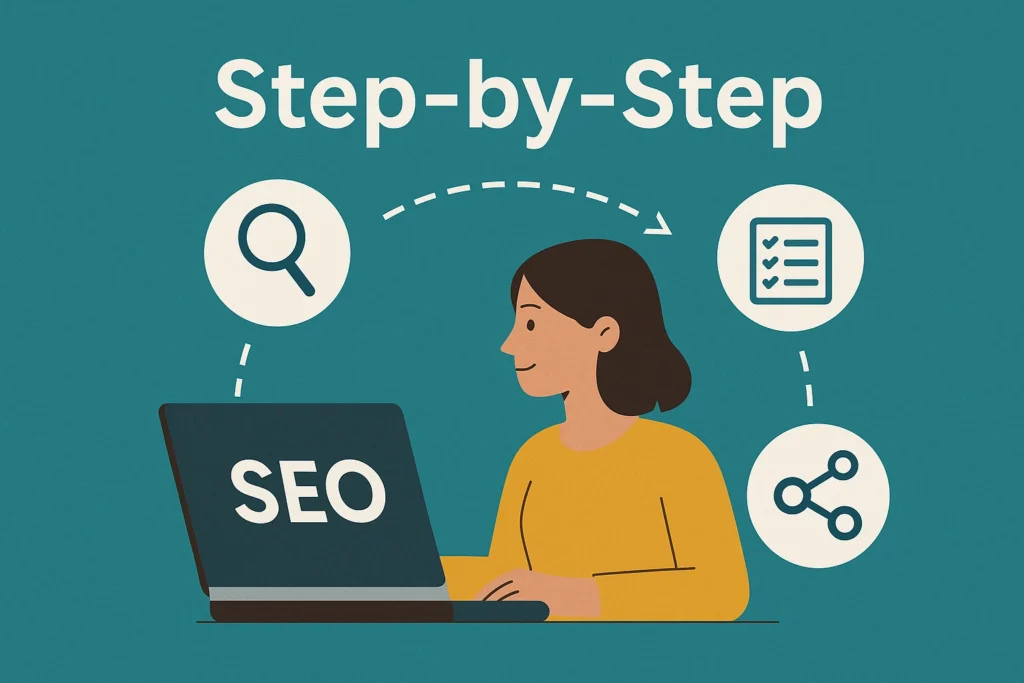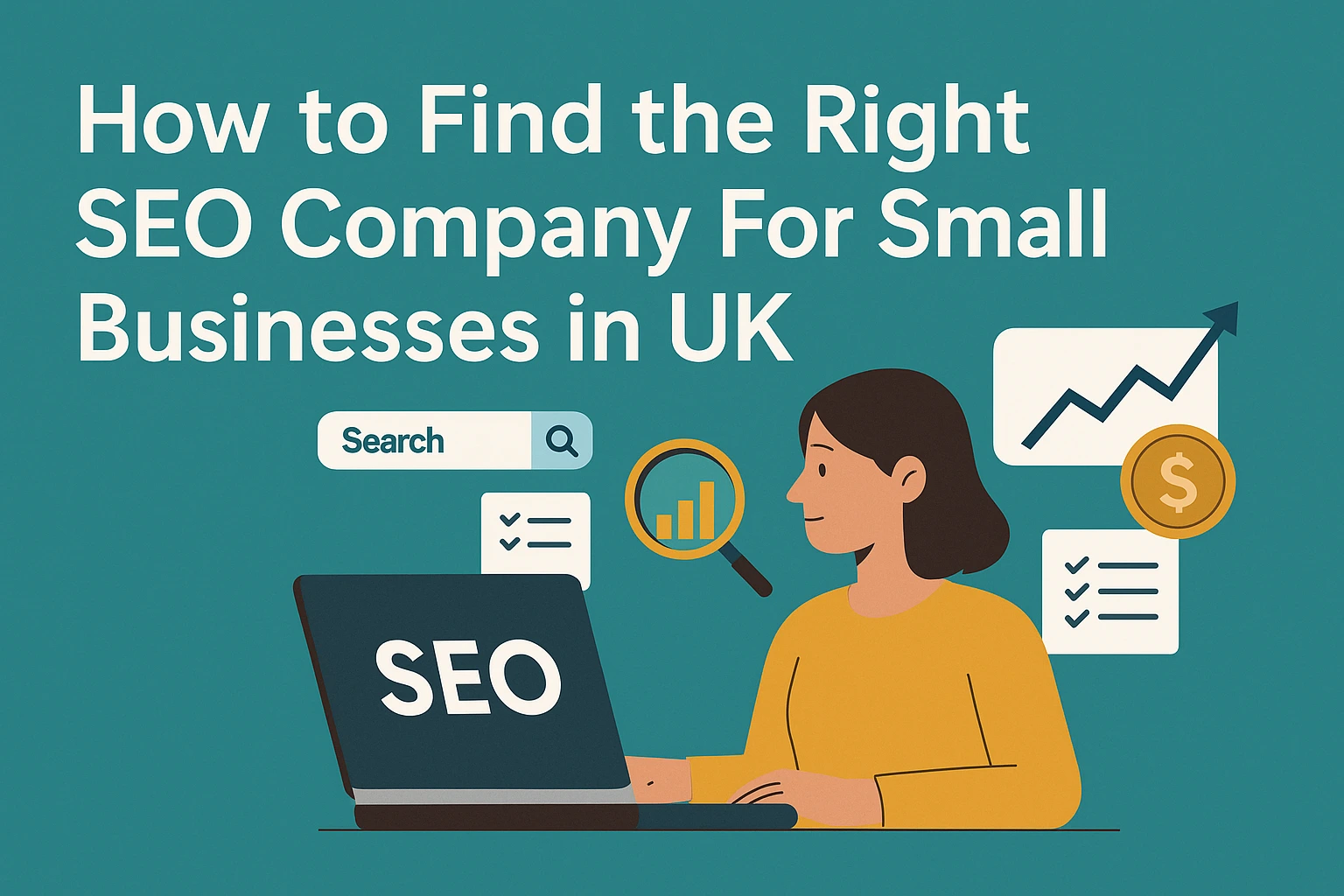Introduction
If you run a small business in the UK, you probably know how challenging it can be to compete with bigger brands. Limited budgets, local competition, and the shift to online shopping make visibility more important than ever. This is where SEO (Search Engine Optimisation) comes in. The right SEO company can help your small business get found by local customers, generate more leads, and grow steadily without overspending on paid ads. But with so many agencies out there, how do you choose the right one? Let’s break it down step by step.
Key Takeaways
- SEO helps small businesses grow by increasing online visibility.
- The right SEO company should have experience with small businesses and knowledge of the UK market.
- Look for transparent pricing, proven results, and services tailored to local needs.
- Avoid agencies promising instant results or offering overly cheap packages.
- Success can be measured through traffic growth, local visibility, and conversions.
Why Small Businesses Need SEO
The importance of being visible online
Today, most people turn to Google before making a purchase. Whether it is booking a plumber in Manchester or finding a bakery in London, customers rely on search engines. If your business does not appear in these searches, you are likely missing out on sales. SEO ensures your website shows up where potential customers are looking.
How SEO helps local customers find you
For small businesses, local SEO is essential. It is not just about ranking nationally but making sure people in your area can find you. Optimising your Google Business Profile, getting reviews, and appearing on Google Maps help nearby customers walk through your door.
Why SEO is more cost-effective than ads
Unlike paid ads, which stop driving traffic as soon as you stop paying, SEO builds long-term visibility. Once your site ranks well, you continue to get traffic without paying per click. This makes SEO one of the most cost-effective marketing strategies for small businesses in the UK.
What to Look for in an SEO Company
Experience with small businesses
An agency that only works with big corporations may not understand the challenges small businesses face. Look for companies that have specific experience helping businesses of your size.
Knowledge of the UK market and local SEO
The UK market has unique customer behaviour, regulations, and search trends. A company familiar with these details will know how to optimise for your audience.
Case studies and past results
Ask for examples of businesses they have helped before. Genuine case studies or testimonials will give you confidence in their ability to deliver.
Transparent pricing and packages
Good agencies will explain exactly what you are paying for.
Some agencies lure clients with low monthly fees but charge extra for essentials like keyword research or content. Always read the fine print.
Choosing monthly vs. one-time services
Monthly packages often make sense for ongoing growth. One-time audits or set-ups can help if you only need a starting boost.
Key Services an SEO Company Should Offer
Keyword research for small businesses
Keyword research is the foundation of any SEO strategy. For small businesses, this means identifying the exact search terms customers use when looking for your products or services. A good SEO company will not just target broad, highly competitive keywords like “plumber London” but will also focus on long-tail searches such as “emergency plumber in North London” or “affordable bakery near me.” These specific keywords often bring in buyers who are closer to making a decision. In the UK market, where local competition is high, the right keywords can make the difference between being buried on page three and showing up at the top where customers actually click.
On-page SEO – titles, descriptions, and content
On-page SEO is about making sure your website speaks the language of both search engines and customers. This includes optimising page titles, meta descriptions, headers, and the body content itself. For example, if you run a café in Birmingham, your site should naturally include words people type in, like “best coffee shop in Birmingham” or “fresh pastries near Birmingham city centre.” Beyond just keywords, good on-page SEO ensures your content is engaging, clear, and easy to read. Search engines reward sites that deliver helpful content, so balancing readability with optimisation is key.
Local SEO – Google Business Profile and maps
For UK small businesses, local SEO is often more important than national SEO. Optimising your Google Business Profile means your business can show up when someone nearby searches for services you provide. For example, a hairdresser in Manchester should appear in “hairdresser near me” searches within their area. Local SEO also includes managing reviews, updating your business hours, and ensuring your address is consistent across the web. Appearing in map results not only drives foot traffic but also builds trust, as customers are more likely to visit businesses that appear prominently in their local searches.
Technical SEO – website speed and structure
Even if your content is strong, a poorly built website can drag you down. Technical SEO covers the behind-the-scenes aspects like site speed, mobile-friendliness, crawlability, and structured data. A slow site that takes more than a few seconds to load can push visitors away, especially on mobile devices where most searches happen. An SEO company will audit and fix technical issues, ensuring search engines can easily crawl your site and users have a smooth experience. For UK businesses, this can be critical—if a customer clicks your site but it lags, they might head straight to a competitor instead.
Link building and digital PR
Links from reputable sites act like votes of confidence for your business. High-quality backlinks from industry directories, local news outlets, or respected blogs show Google that your site is trustworthy. A strong SEO company will not rely on spammy link-building methods but instead focus on outreach and digital PR campaigns that attract natural, relevant links. For small businesses, even a handful of links from credible local sites can dramatically improve search rankings.
Ongoing tracking and reporting
SEO is not a one-time fix; it is an ongoing process. That’s why regular tracking and reporting matter. A professional SEO company should provide clear monthly reports showing your keyword rankings, website traffic, conversions, and areas for improvement. This transparency helps you understand where your investment is going and whether strategies are working. For small UK businesses, this visibility ensures you stay in control of your growth journey.
Red Flags to Avoid When Choosing an SEO Agency
Companies that promise instant results
SEO is a long-term investment. If a company promises overnight rankings or page-one results in a week, it is a sign they are likely using risky tactics. In reality, SEO results usually take three to six months to show steady progress. Be cautious of “quick win” guarantees—they often end in disappointment or penalties.
Lack of clear reporting
A trustworthy SEO company will always show you how your site is performing. If an agency is vague about results or refuses to provide regular updates, it is a red flag. Without clear reporting, you cannot measure success or know whether strategies are working.
Using black-hat SEO tactics
Black-hat SEO refers to shady practices like buying links, stuffing keywords unnaturally, or creating fake listings. While these might bring a temporary boost, they almost always lead to penalties from Google. Recovering from a penalty can take months and cost even more.
Overly cheap packages that sound too good
If the price seems unbelievably low, you are probably getting a cookie-cutter package with little real value. Good SEO requires time, effort, and expertise. A cheap deal often means corners are being cut, which can hurt your long-term success.
How to Compare SEO Companies in the UK
Asking the right questions before signing
Before committing, ask direct questions: “How do you approach local SEO?” “What kind of results have you achieved for small businesses like mine?” “How do you track ROI?” The answers will reveal whether the company is genuinely skilled or just using sales talk.
Comparing services vs. cost
While budget matters, focus on the value provided. One company may charge £800 a month but offer a comprehensive service, while another may charge £500 but only do basic tasks. Look at the scope of work, not just the price tag.
Checking client reviews and testimonials
Online reviews on Google, Trustpilot, or Clutch give you insight into real client experiences. Pay attention to detailed reviews rather than generic ones, as they often reflect the agency’s strengths and weaknesses.
Trial period or short-term contract
Some agencies may allow a three-month contract instead of locking you into a year. A shorter contract gives you flexibility and lets you test how well the agency performs before making a long-term commitment.

Steps to Hiring the Right SEO Partner
Make a list of your business goals
Clear goals help you and the SEO company stay aligned. Whether your focus is more online enquiries, higher foot traffic, or e-commerce sales, write these down before starting your search.
Shortlist agencies that fit your niche
Not all SEO agencies work with all industries. If you run a small law firm, look for an agency with experience in legal SEO. If you own a café, choose an agency that knows local food and hospitality markets.
Ask for an SEO audit or proposal
A good SEO partner should be willing to provide an initial audit of your website. This shows they have done their homework and can identify your strengths and weaknesses before you commit.
Evaluate communication and support style
The best results come from partnerships where communication is open and jargon-free. An agency should explain strategies in plain English, so you understand exactly what they are doing and why.
SEO Costs for Small Businesses in the UK
Average monthly pricing range
In the UK, most small businesses spend between £500 and £2,000 per month on SEO. The price depends on your industry, goals, and competition.
What affects the cost of SEO?
Industry competition
Some industries, like law, real estate, or finance, are highly competitive and need more resources to achieve results.
Number of keywords targeted
If you want to target a few local keywords, the cost may be lower. But if your goal is to rank nationally for dozens of keywords, it will naturally cost more.
Size of the website
A large e-commerce site with hundreds of pages will require more optimisation than a small five-page brochure site. More pages mean more time, which increases costs.
Measuring Success After Hiring an SEO Company
Traffic growth
Steady increases in organic traffic show that your SEO investment is paying off. Keep an eye on your analytics to see how many people are visiting your site and from where.
Local visibility improvements
If your business starts appearing in map packs and local search results, that’s a sign your local SEO strategy is working. For small UK businesses, this visibility often leads directly to more calls and walk-ins.
Conversions and leads
Traffic alone is not enough-you want results. More phone calls, form submissions, online purchases, or in-store visits are proof that your SEO strategy is converting browsers into buyers.
Long-term ranking stability
The true test of good SEO is whether your rankings hold steady over time. Quick spikes are not as valuable as long-term stability, which shows your business is building real authority online.
Final Thoughts
Finding the right SEO company for your small business in the UK may feel overwhelming, but the process becomes easier when you know what to look for. Focus on agencies that understand local SEO, are transparent with pricing, and have proven results. Avoid those promising instant wins or suspiciously cheap deals. Remember, SEO is a long-term investment, but when done right, it can transform your business visibility and growth.
FAQs
How much does SEO cost for small businesses in the UK?
Most small businesses spend between £500 and £2,000 per month on SEO, but the exact cost depends on your goals and competition. For example, a small café in Leeds looking to attract local customers may only need basic local SEO, which costs less. But if you run an e-commerce shop competing nationwide, the budget will need to be higher. Factors like the size of your website, the number of keywords targeted, and how competitive your industry is all affect price. Think of SEO as an investment-cutting corners often leads to poor results, while a realistic budget ensures steady, long-term growth.
How long does it take for SEO to show results?
SEO is not instant-it usually takes 3 to 6 months before you notice steady improvements. Early signs may include more website visits, a few keywords moving up in rankings, or your business appearing on Google Maps more often. However, full results, such as consistent top rankings and regular leads, can take 6 to 12 months depending on your industry. For example, a local cleaning company in Bristol might see results quicker than a solicitor in London competing against national firms. The key is patience-SEO is a long-term strategy that builds momentum over time.
Should small businesses hire an agency or freelancer?
Both options have pros and cons. Agencies usually provide a team of specialists—covering keyword research, content writing, technical SEO, and link building. This gives you a well-rounded approach and consistent support, but costs can be higher. Freelancers, on the other hand, may charge less and offer more personalised attention, but they might lack the resources for larger projects. For many UK small businesses, the choice depends on budget, goals, and the level of support you need. If your business is just starting out, a skilled freelancer might be enough. But if you want long-term growth, an agency often provides more stability and expertise.
What is the difference between local SEO and regular SEO?
Local SEO focuses on improving visibility within a specific area. This includes optimising your Google Business Profile, showing up in map searches, and targeting keywords like “electrician in Manchester” or “florist near Liverpool.” It is perfect for businesses that rely on foot traffic or local clients. Regular SEO, also called organic or national SEO, aims for broader reach. It targets wider keywords like “best online shoe shop UK,” which helps businesses trying to attract customers nationwide. For small businesses, local SEO often delivers the quickest wins, while regular SEO works best for brands wanting to expand beyond their region.
Can I do SEO myself instead of hiring a company?
Yes, you can handle SEO yourself if you are willing to learn the basics. Many UK small business owners start by optimising their Google Business Profile, improving their website speed, and writing blog posts targeting local keywords. However, SEO can be time-consuming and mistakes are common-such as targeting the wrong keywords or overlooking technical issues. Hiring an expert, whether a freelancer or an agency, usually speeds up results and helps you avoid costly errors. Think of it like doing your own plumbing-you can learn and try, but a professional will often do the job quicker, better, and with fewer risks.

